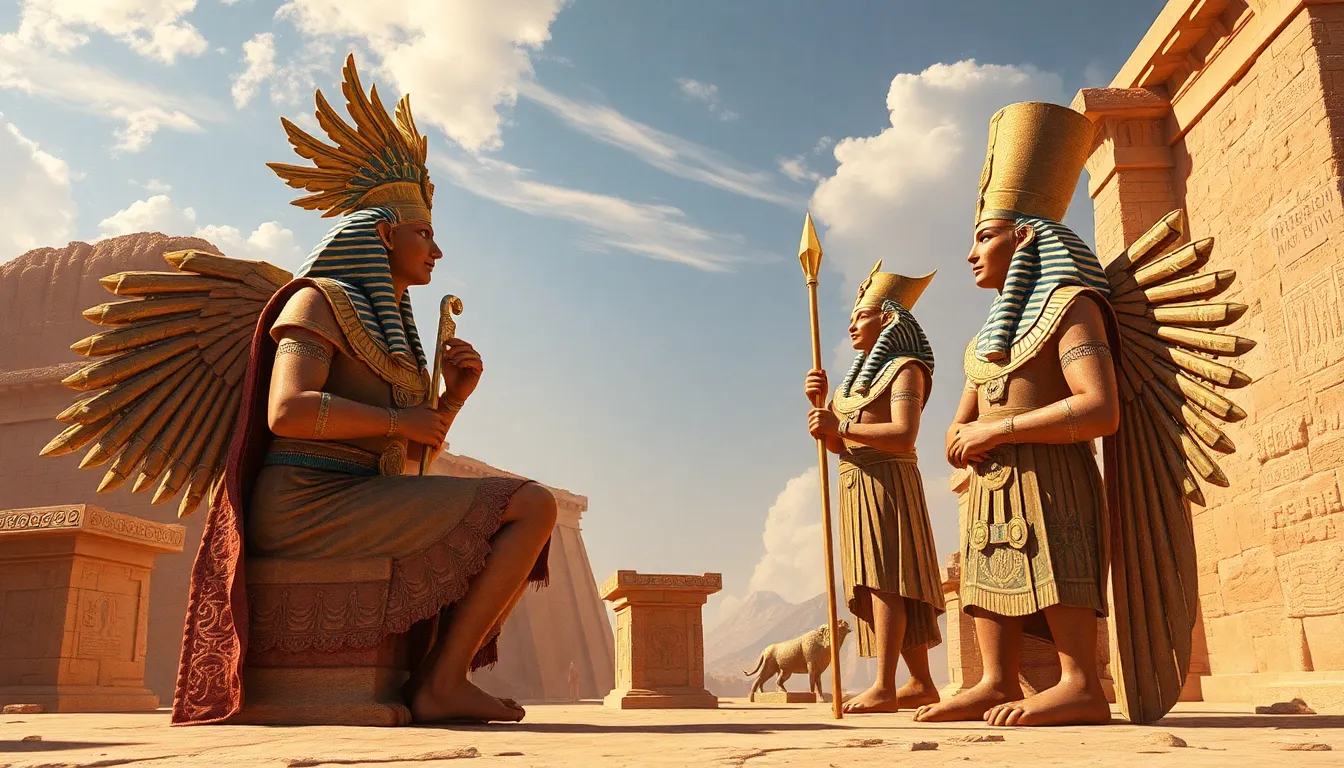The Role of Divine Kingship in Egyptian Diplomacy
I. Introduction
Divine kingship in ancient Egypt refers to the belief that the pharaoh was not only a political leader but also a divine figure, a living god on earth. This concept underpinned the authority of the pharaoh and shaped the governance structure of ancient Egyptian society. The significance of diplomacy in this context cannot be overstated; it played a crucial role in maintaining peace, fostering trade, and establishing alliances with neighboring states. This article explores the intersection of divine kingship and diplomacy, shedding light on how these two elements influenced each other in ancient Egypt.
II. Historical Context of Divine Kingship
The evolution of kingship in ancient Egypt can be traced from the early dynastic period through to the Ptolemaic era. Initially, pharaohs were seen as earthly representatives of the gods, responsible for maintaining maat, or cosmic order. Over time, this role evolved, but the connection between the pharaoh and the divine remained central.
Religious beliefs surrounding the pharaoh’s divinity were intricately linked to the concept of divine kingship. The pharaoh was believed to possess divine qualities, which justified his rule and authority over the people. This belief was reinforced through various religious ceremonies and rituals that highlighted the pharaoh’s special relationship with the gods.
As the mediator between the gods and the people, the pharaoh held the unique position of communicating divine will and ensuring the prosperity of the nation. This role not only legitimized his power domestically but also shaped how foreign entities perceived and interacted with Egypt.
III. Diplomatic Strategies Employed by Pharaohs
Pharaohs employed various diplomatic strategies to solidify their power and maintain stability within their realms and beyond. Some of the most notable strategies included:
- Marriage alliances: Marriages between pharaohs and foreign princesses were a common strategy to forge alliances and enhance political power.
- Tribute systems: Pharaohs would establish tribute systems where vassal states provided resources in exchange for protection, thus ensuring economic and political leverage.
- Gifts and ceremonial exchanges: The exchange of gifts was a diplomatic tool that symbolized goodwill and reinforced relationships between nations.
IV. The Role of Religion and Ritual in Diplomacy
Religion and ritual played pivotal roles in Egyptian diplomacy. Religious ceremonies were often used as diplomatic tools to signify peace and foster cooperation among nations.
Temples served not only as religious centers but also as venues for international relations. They were places where treaties could be formalized and alliances celebrated. The divine endorsement of diplomatic actions through rituals increased their legitimacy and importance.
The impact of divine endorsement on diplomatic legitimacy was profound. A pharaoh whose actions were seen as supported by the gods would inspire confidence among his subjects and foreign allies alike, thereby strengthening Egypt’s position in the ancient world.
V. Case Studies of Notable Diplomatic Efforts
Several notable pharaohs exemplify the intersection of divine kingship and diplomacy:
- Akhenaten and Nefertiti: Known for their religious reforms, Akhenaten and Nefertiti also engaged in diplomatic marriages and alliances that aimed to promote their new monotheistic worship of Aten.
- Ramses II and the Treaty of Kadesh: Ramses II is famous for his military campaigns and subsequent treaty with the Hittites, which was celebrated as a divine triumph and marked a significant moment in diplomatic history.
- Hatshepsut: As one of the few female pharaohs, Hatshepsut focused on fostering trade relations, particularly with Punt, showcasing how diplomatic efforts could be intertwined with economic prosperity.
VI. The Impact of Divine Kingship on Foreign Relations
The perception of pharaohs by foreign leaders was heavily influenced by the concept of divine kingship. Foreign rulers often viewed the pharaoh as a powerful deity, which affected their willingness to engage in diplomacy.
Divine kingship shaped treaties and alliances, as the endorsement of a pharaoh’s divine right to rule could make a treaty more appealing to foreign entities. The long-term effects on Egypt’s geopolitical landscape included the establishment of a network of alliances and vassal states, which helped to secure Egypt’s borders and foster economic growth.
VII. Challenges and Limitations of Divine Kingship in Diplomacy
Despite its strengths, divine kingship in diplomacy faced several challenges and limitations:
- Internal dissent: Dissent within Egypt could weaken a pharaoh’s position and complicate diplomatic relations.
- Tension between divine authority and practical governance: The expectation that a pharaoh must act as a god could conflict with the practical needs of governance.
- Competing regional powers: The rise of other powerful states often diminished the effectiveness of Egypt’s diplomatic strategies and forced pharaohs to adapt or lose influence.
VIII. Conclusion
In summary, divine kingship was a fundamental aspect of ancient Egyptian diplomacy. The interplay between the pharaoh’s divine status and diplomatic practices shaped the political landscape of ancient Egypt and its interactions with neighboring states. The legacy of divine kingship continues to be a topic of interest for scholars and enthusiasts alike, highlighting the complex nature of power, religion, and diplomacy in one of history’s most fascinating civilizations. Future research could delve deeper into specific case studies or explore how these diplomatic practices evolved over time as Egypt faced new challenges.




